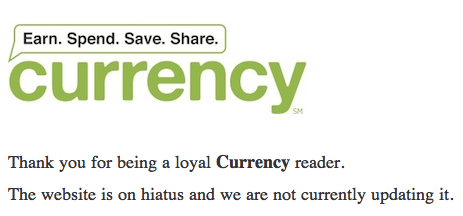Last year, American Express created a website that concentrated on personal finance: GetCurrency.com. They solicited writers from among the most prominent personal finance bloggers. We offered our talents, and the GetCurrency.com editors found our submissions wanting. Meanwhile, they’d run posts from that earnest imbecile at The Simple Dollar who tells blatant lies about how his 4-year-old has started a college fund.
As 2011 enters the home stretch, guess what? Control Your Cash is going better than ever. As for GetCurrency.com, here’s a recent screenshot:
Schadenfreude, and it feels so good…
So here it is again, our annual post about the best possible Christmas gift. We recommend this gift as suitable for giving to just about any individual or business. Except for GetCurrency.com; for them we’d go with a cemetery plot and a gravestone. Season’s freaking Greetings.
From a utilitarian perspective, giving gifts makes no sense. Generally speaking, you buy gifts for people who are likely to buy you gifts – hence the term “exchanging”. Receive a gift from someone you had no intention of buying anything for, and you’re selfish and inconsiderate. Do the opposite and you’re a sucker. And if you do buy something for someone who buys something for you, custom dictates that the gifts can’t be of disparate value: hence the ludicrous practice of removing price labels. After all, nothing ruins the joy of receiving a thoughtful and apposite gift than finding out the donor spent too little on it.
Think about it: you spend money to get people things that you hope they’ll like. If they don’t, you’ve wasted your time and resources. Thus the most useful possible gift is the one perfectly adaptable one: cash. But again, the suitability of cash runs into the brick wall of decorum. ‘Tis the season to be gauche. And again, if the recipient adopts the same logic about gift-giving, you end up exchanging cash for cash. Reduced to its fundamentals, the transaction is easy if quotidian: instead of you buying me a $150 gift and me buying you a $160 one, I should just give you $10. Then we can spend the next year discussing how I’m tacky and you’re cheap.
If you’re the parent of a young adult, or otherwise have someone in your life whose net worth isn’t yet where yours is, here’s a mutually beneficial idea for a decidedly American gift that isn’t cash: the next best thing, credit.
The average college graduate receives that bachelor’s degree with a 5-digit Sallie Mae obligation. As for the prudent and responsible students who manage to graduate with no or minimal student loans, doing so usually means there’s hardly enough money remaining to create any kind of nest egg. The wealth-building years have begun in earnest, but there’s almost nothing to lay a foundation with. Renting an apartment for the next few years (an investment with a guaranteed rate of return of -100%) wipes away much of the equity a young person could be building.
If you can afford it, lend your upwardly mobile kid enough to cover the down payment on a modest little domicile. Even buying the tiniest of townhomes gives him or her the opportunity to build equity, and to exercise the care and consideration for one’s things that renters have no incentive to.
Say you find an $80,000 condo that requires a 20% down payment to avoid private mortgage insurance costs. Financing the remaining $64,000 at today’s 3.40% 15-year rates means your kid would write monthly checks for $454.39, which makes far more sense than spending $800 on a larger rental house in a fancier part of town.
Remember, this isn’t a gift in the traditional sense. As the giver, you’re expecting something in return – regular payments, with interest. If you can give your kid a 100-basis point break on market rates, she could pay back that $16,000 loan back to you in $105.93 monthly installments. Which should be pretty easy to do, especially if she’s collecting rent from a roommate. Of course, we’re assuming she’ll be making gradually more money throughout the life of her concurrent loans.
The real “gift” in this situation is something intangible but vital: an introduction to real-world finance, and a chance to exercise responsibility. It’s the ideal meeting of a recipient whose ambitions outweigh her wherewithal, and a donor with the ability to make the recipient’s transition into the world of commerce run a little more smoothly.
So for a close loved one who’d stand to benefit from the gesture, don’t “give” a gift. Lend something instead. That way you can help foster a sense of ownership and responsibility, which beats a trinket or a consumable any day of the week.
**This article is featured in the Carnival of Personal Finance #341: Christmas in Australia Edition**





